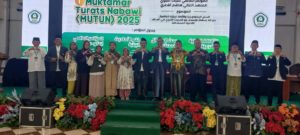The EKOPESANTREN programme is managed by the Centre for Islamic Studies at Universitas Nasional (PPI UNAS) in Jakarta with the support of various professional and industry partners. It was designed to become a movement for change for a network of Islamic boarding schools (Pesantren) in Indonesia not just to raise awareness about the need for climate and ecological action but also to implement practical and self-help programmes for the students and their communities.
One of the ten EKOPESANTREN initiatives focuses on advancing sustainable, renewable energy as a source of electricity. PPI UNAS is collaborating with 50 schools from planning to constructing solar panels to support their educational activities, starting with those receiving insufficient or unreliable electricity.
According to the Pew Research Center, in 2022, Indonesia had the largest population (12.7%) of Muslims worldwide with around 241.5 million. Pesantrens make up a large segment of educational institutions in Indonesia which has a Muslim majority. According to the Ministry of Religious Affairs, in April 2022 there were more than 39,000 pesantren schools in the country with a total number of students approaching 4 million. Pesantren alumni occupy many positions in society including those in key decision-making roles in the state and society at various levels and fields. Hence, they can play an important and strategic role in building a movement towards improving the environment and in addressing the climate crisis.




